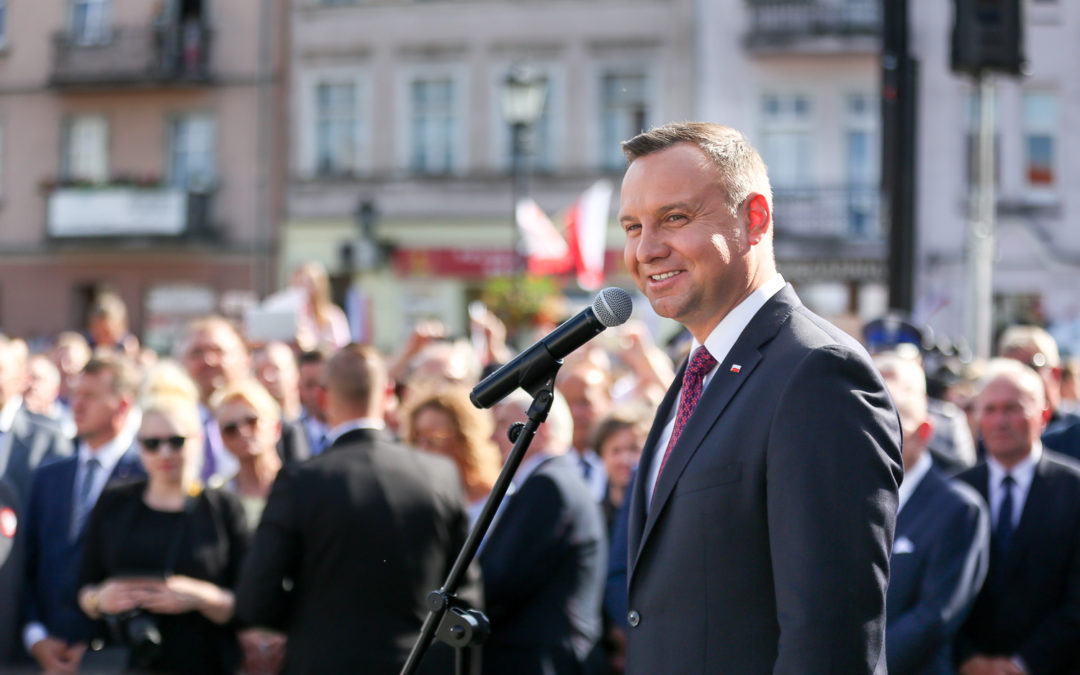By Aleks Szczerbiak
Given his credibility in helping deliver the government’s popular social spending and welfare policies – and strong base in small-town, provincial Poland – the right-wing incumbent starts as favourite in May’s crucial presidential election. But his fortunes are linked to the ruling party’s popularity and, given how polarised and evenly divided the Polish political scene is, the election will be closely fought and unpredictable.
Two evenly balanced camps
Notwithstanding the as-yet-unpredictable impact of the Coronavirus epidemic, over the next couple of months Polish politics will be dominated by the crucially important 10 May presidential election, with a second round run-off held a fortnight later between the two leading candidates if none secures more than 50% of the votes.
The election is likely to determine the shape of the political scene until the next parliamentary poll scheduled for autumn 2023. A victory for incumbent Andrzej Duda – who is supported by the right-wing Law and Justice (PiS) grouping, Poland’s ruling party since autumn 2015 – would give the government a three-year run without any national elections to continue implementing its programme of radical state reconstruction.
However, given that the party lacks the three-fifths legislative majority required to over-turn a presidential veto, Duda’s defeat would be a disaster for Law and Justice seriously hampering its ability to govern effectively and possibly precipitating an early parliamentary election.
Most commentators assumed Duda would win easily given his high levels of popularity. A February survey conducted by the CBOS polling agency found that he enjoyed a 60% approval rating, the highest of any Polish politician, while 57% were satisfied with the way that he was performing his duties (although both of these have fallen in recent months).
The ‘Ewybory’ website that aggregates voting intention surveys found Duda averaging 42% support, nearly twenty points ahead of his nearest rival Małgorzata Kidawa-Blońska, the candidate of the liberal-centrist Civic Platform (PO), Poland’s ruling party between 2007-15 and currently the main opposition grouping. Polls also suggest that Duda would defeat all potential challengers in a second round run-off, albeit by a much narrower margin.
However, five years ago Duda’s Civic Platform-backed predecessor Bronisław Komorowski enjoyed even higher approval ratings but failed to secure re-election. Moreover, last autumn’s parliamentary election – when Law and Justice retained its overall majority but lost control of the Senate, Poland’s less powerful second chamber – showed how polarised and evenly balanced support for the government and opposition is, with many voters determined to use any opportunity to block the ruling party. The presidential poll will, therefore, be a much greater challenge for Duda than previously anticipated.
Duda’s assets
One of Duda’s strengths is that he is an energetic and dynamic campaigner who can connect with ordinary Poles and has made great efforts to reach out to the often-forgotten parts of small-town, provincial Poland that constitute Law and Justice’s electoral heartland. Earlier this year, Duda fulfilled his pledge to become the first President to visit every one of Poland’s 380 administrative counties during his term of office.
Duda’s Tour de Pologne: how the president is making small-town Poland his springboard to re-election
This vision of the presidency, showing as much respect to citizens living in smaller towns and rural areas as those in larger urban agglomerations, provided Duda with enormous political capital going into the campaign. It dovetails with Law and Justice’s broader political project, which some commentators term the “redistribution of prestige”, whereby ordinary Poles who previously felt themselves to be second-class citizens started to regain a sense of dignity and self-respect.
Duda’s core appeal is as the guarantor of the Law and Justice government’s programme of so-called “good change” (dobra zmiana). This has involved hugely expanding social spending and welfare policies for families and low-income households who felt frustrated that they had not shared sufficiently in Poland’s post-communist transformation, while simultaneously maintaining strong economic growth and reducing the state budget deficit.
His supporters also point to Duda’s apparent foreign and defence policy successes, particularly in developing closer ties with the USA. Although these areas lie primarily within the government’s domain, the constitution gives the president an informal oversight and co-ordinating role, and he is also commander-in-chief of the armed forces.
Law and Justice argues that Duda played a key role in strengthening Poland’s defence infrastructure through the additional deployment of US and NATO troops on Polish territory. They also credit him with the lifting of the requirement for Poles visiting the USA to obtain visas, which Polish governments have campaigned for for many years.
Duda is fortunate that Kidawa-Błońska – who, unless there is a major change in the campaign dynamics, is very likely to be his second round challenger – appears to be a relatively weak opponent. She was originally chosen as Civic Platform’s prime ministerial candidate in last autumn’s parliamentary election because of her reputation as an emollient and conciliatory political figure. But Kidawa-Błońska’s critics argue that she lacks any significant achievements in spite of her many years in politics and is an unimpressive public speaker with untested debating skills.
The election campaign is likely to be a very brutal, but if she tries to adopt a more combative approach this could undermine her image as the candidate of societal dialogue and reconciliation. Moreover, although Kidawa-Błońska undoubtedly comes across as sophisticated and urbane, critics say that she also embodies the aloof urban liberal elites who, Law and Justice claims, look down upon the inhabitants of small-town provincial Poland. More broadly, Law and Justice accuse Kidawa-Błońska of lacking an alternative programmatic vision, arguing that she would simply use the presidency to sabotage the government.
Another plebiscite on Law and Justice?
However, Duda will almost certainly not win in the first round and, given how divided and polarised the political scene is, no matter how weak the opposition candidate the second round is likely to be extremely closely-fought and unpredictable. Civic Platform knows that Kidawa-Błońska is not an ideal candidate, but political marketing specialists are already working hard to minimise her weaknesses as a communicator.
Ironically, although she has been part of the party establishment for many years, Kidawa-Błońska’s lack of any real governing experience means that she is not as clearly identified in the public mind with the previous, discredited Civic Platform-led administrations. Moreover, the opposition retains several important political assets including: substantial financial resources and the backing of much of the privately-owned media, as well as significant influence within, and widespread support from, Poland’s cultural, legal and business elites.
Duda’s biggest weakness is his vulnerability to the accusation that throughout his presidency he has been marginalised in key state policy decisions and simply acted as the government’s “notary”. In many ways this is not surprising, as Duda broadly agrees with much of Law and Justice’s critique of the alleged dysfunctionality of the post-communist state and its core institutions; his disagreements are generally over how radical reforms should be and the best means of achieving them.
But Duda cannot simply rely on the support of the Law and Justice core electorate and to attract more than 50% of the votes needs to craft a broader appeal. Except for one occasion – in July 2017, when he vetoed two of the government’s flagship judicial reform laws (and even then the revised versions that he proposed were very close to the originals) – Duda has not really made any serious attempts to carve out a role for himself as an independent political actor able to transcend the government-opposition divide.
More broadly, critics argue that Duda’s presidency lacks a clear defining concept and he has been ineffective in both carrying forward any independent political initiatives and developing a strong intellectual and political support base, preferring instead to surround himself with technocrats.
Indeed, the opposition’s strategy is to turn the election into a plebiscite on the Law and Justice government by tying Duda as closely as they can to the ruling party. Although Law and Justice continues to enjoy a clear opinion poll lead, the government is feeling the strain of having been in office for four-and-a-half years. A slowdown in the economy has put pressure on the state budget, making it difficult for Law and Justice to offer any substantial new social spending and welfare pledges, the key to mobilising its supporters in previous elections.
In January, inflation hit 4.4%, the highest rate for eight years, which, apart from impacting upon living standards more generally, will have eaten into the income boost which Poles received from the government’s welfare payments and fiscal transfers; and recently approved new taxes will also start to hit Polish consumers.
While Duda’s personal popularity remains higher than that of the ruling party, a key group of voters who are positively inclined towards him but do not necessarily support Law and Justice may use the election to articulate that discontent. So he needs to find a way of undermining this over-arching plebiscitary logic. In 2015, Duda ran as an insurgent opposition candidate of change but, as an incumbent defending a record, it will be difficult for him to replicate the energy and dynamism of that campaign. Nonetheless, if he is to avoid the trap that Komorowski fell into five years ago, Duda will have to once-again offer a fresh reform agenda rather than simply standing as the candidate of the governing status quo.
Moreover, Duda’s re-election campaign got off to a shaky start when the opposition called upon him to veto a government-sponsored law providing a 2 billion złoty subsidy to compensate Polish state broadcasters for shortfalls in licence fee payments, and instead spend the money on improving cancer treatment. Civic Platform pounced on an apparently obscene gesture by Law and Justice deputy Joanna Lichocka (for which she later apologised) during the parliamentary debate on the draft law, turning it into viral social media meme which they said symbolised the ruling party’s arrogance and contempt for cancer patients.
They accused Law and Justice of depriving the health service of funds to subside a government propaganda tool (the ruling party argues that previous administrations also used Polish state TV in this way and that its current political stance simply brings pluralism and balance to a media landscape otherwise dominated by the party’s opponents). In the event, Duda approved the law, but not before forcing the resignation of Polish state TV’s controversial president Jacek Kurski, and then announced a separate, substantial increase in health service funding.
Underlying factors still working for Duda?
Polish presidential elections often see very rapid shifts in public support in a short space of time and Duda’s room for manoeuvre is extremely tight. The biggest threat to him could be the de-mobilisation of his disproportionately small-town and rural electorate, which is generally much less interested in politics, while the government’s opponents will be highly motivated to turnout, especially in the second round.
Nonetheless, there are still a number of important underlying factors working in Duda’s favour, notably his credibility in helping to deliver Law and Justice’s very popular social spending and welfare policies while the economy remains fairly buoyant. Duda has also developed his own distinctive presidential style based on highly personal contacts with the electorate. A key difference with his predecessor is that Duda faced a sustained attack throughout his presidency from the still-influential opposition-supporting private media, so his base of support should be more solid.
For sure, Civic Platform has certainly become more tactically astute and effective at political marketing on issues such as health service funding, and a below-expectations first round result for Duda could change the campaign dynamics. But Kidawa-Błońska is still trying to mobilise voters primarily on the basis of opposition to the government and has not articulated a convincing alternative vision of the presidency that could decisively rally voters to her cause in a tight second round run-off.
Main image credit: Kancelaria Prezydenta/Krzysztof Sitkowski





















